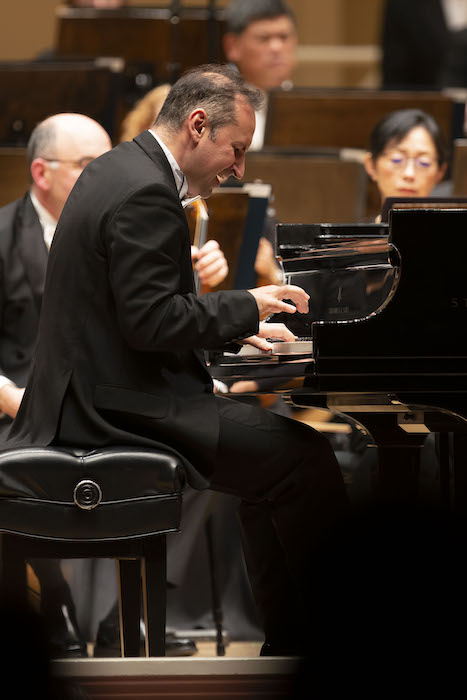A wild Rachmaninoff ride and a Tchaikovsky rarity from Heras-Casado, CSO and Trpčeski

Back from a three-week Asian tour, the Chicago Symphony Orchestra likely intended Thursday’s populist Russian program of Rachmaninoff and Tchaikovsky as a marketing-friendly, Romantic evening suitable for a Valentine’s Day evening.
In the orchestra’s first Chicago concert in a month, the musical results were more successful than the program would indicate, with a bravura solo turn by the singular Simon Trpčeski, and conductor Pablo Heras-Casado making his most impressive CSO podium appearance to date.
The first half of the evening was devoted to Rachmaninoff’s Piano Concerto No. 3 with Trpčeski as solo protagonist. While he has long been feted in this repertoire, the Macedonian pianist is something of a wild man in the solo spotlight. Trpčeski was a restless presence on the bench during orchestral episodes— gazing up into the audience, turning around to look at the violins, smiling and rocking to the music and marking string pizzicatos with smoke-puff hand gestures.
One was convinced that he was going to miss an entrance with all the distracting swing and sway with Sammy Kaye; yet Trpčeski always managed to come in on time and accurately.
As one would expect, this was a performance of volatility and extremes—almost more of an anti-Valentine’s Day Rachmaninoff outing. The pianist seemed almost casual and offhand in the opening movement, light and confiding, a welcome departure from the usual monumental approach. Yet that was clearly just a feint, for the first virtuosic outbreak brought an explosive attack of hyperactive intensity.
Trpčeski opted—no surprise—for Rachmaninoff’s longer cadenza, yet he made this music feel not just like a showy moment for solo bravura but a crucial and integral part of the larger canvas. Rarely will one get such an extramusical sense of building conflict, intense struggle and tragedy temporarily surmounted as Trpčeski brought to the cadenza.
The Intermezzo’s lyrical repose and Russian melancholy were slighted somewhat by the soloist’s tense, hair-trigger volatility, though the scherzando section was aptly light and vivacious.
For all his eccentric stage mannerisms, Trpčeski’s technique is unassailable. He tackled the finale’s virtuosic bursts with jarring power and speed and nary a dropped note, Heras-Casado and the orchestra scrambling to keep pace. The pianist pumped up the adrenalin to the final bars, yet so exhilarating were his chops and virtuosity one can even forgive his showmanship in leaping up from the piano with the final chord.
Heras-Casado deserves kudos for keeping things on track with Trpčeski (avoiding eye contact with his soloist throughout probably helped).
The inevitable roaring applause brought the pianist back out for some Valentine’s Day banter and a supple performance of Chopin’s Waltz in A minor, Op. posthumous, rendered with an elegant touch and finely calibrated rubato.
Tchaikovsky’s early symphonies are more notable for atmosphere and scoring than dramatic depth and cohesion. Yet they have much to offer and it’s gratifying to see these neglected works slowly tiptoeing in from the edges of the repertoire.
Tchaikovsky later referred affectionately to his Symphony No. 1, written at age 26, as “a sin of my youth.” Subtitled “Winter Dreams,” the First has its weaknesses, but is the most richly melodic of the composer’s first three works in the genre —in addition to being climatologically apt for February performances in Chicago.
Heras-Casado seemed intent on demonstrating that this work possesses greater symphonic stature than is generally acknowledged. Perhaps some atmosphere was sacrificed with his fleet tempo, yet Heras-Casado brought forceful tuttis and weighty grandeur to the opening movement, usually rendered as an easygoing winter idyll.
Relaxed yet in control, the Spanish conductor drew impassioned playing throughout yet skillfully tempered balances and refused to go over the top with volume or speed. Directing the music sans baton with flowing, graceful gestures, he drew burnished string textures without the music ever turning soupy.
The second movement (“Land of Dreams, Land of Mists”) offers one of Tchaikovsky’s most indelible early melodies, and was given ardent playing by the CSO strings. On a night with most of the woodwind principals off, Jennifer Gunn offered the most impressive solo turn with her pure and graceful playing in a too-rare appearance in the first flute chair.
The wintry Scherzo went with apt energy and bustle, Heras-Casado bringing balletic lift to the waltz-like trio theme. The conductor patiently charted the final movement, giving ample breathing room to the basses in the lugubrious opening bars, and ratcheting up each appearance of the insistent main theme to the triumphant coda.
The program will be repeated 8 p.m. Saturday and 3 p.m. Sunday. cso.org; 312-294-3000.
Posted in Performances



